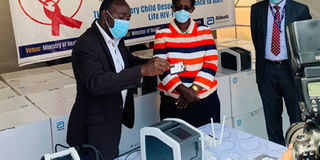Govt receives machines to detect HIV in babies

What you need to know:
- While commemorating the World Patient Safety Day, Dr Atwine said this year’s event focuses on creating awareness on how both patients and health workers can be safe.
The Ministry of Health yesterday received 100 testing machines for increasing early detection of HIV/Aids in children whose mothers are living with the virus.
The Shs11b Abbott m-Pima Point of Care machines were donated by Abbott, a United States-based health company dealing in diagnostics and medical devices.
Mr Hassan Ssegujja, the company’s country manager, handed over the equipment to the Ministry of Health in Kampala yesterday.
While receiving the equipment, the Health ministry’s Permanent Secretary, Dr Diana Atwine, said early detection of HIV among children enables immediate access to treatment and boosts efforts to eliminate HIV transmission.
Dr Atwine said the machines will be distributed to 100 health facilities across the country.
Dr Joshua Musinguzi, the programme manager at Aids Control Programme, said the machines will be used in prevention of mother-to-child transmission, but could later be used for viral load testing, which is a standard measure for success in HIV/Aids treatment.
“We will be focusing on babies born of mothers who are HIV-positive. We have approximately 100,000 HIV-positive mothers who give birth every year and the aim is to make sure all those deliver children that are HIV free,” Dr Musinguzi said.
He added that infants are tested three times before their second birthday.
“When they are born, we test them in the first six months, then another test at nine months and the third test at 18 months. Each time we make sure they are on drugs,” he said.
Process
Mr John Kamushaaga, the service engineer for Life Care Diagnostics, partners of Abbott, said each test on the machine takes 52 minutes and can conduct at least eight tests a day. The machines are also connected to the central laboratory and results are automatically transferred to the server. While commemorating the World Patient Safety Day, Dr Atwine said this year’s event focuses on creating awareness on how both patients and health workers can be safe.



